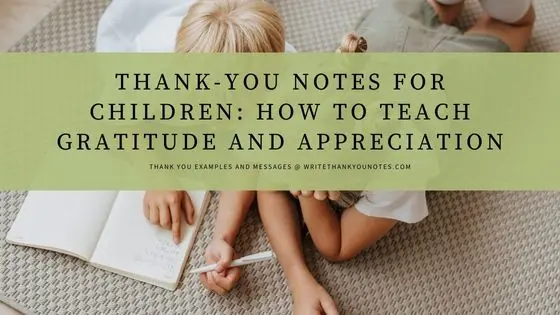By expressing gratitude and appreciation for the kindness of others, children can learn empathy and compassion. It can be a challenge to get children to understand the concept of expressing appreciation and to make it a habit in life.
Teaching children the importance of gratitude and appreciation can help them develop into more well-rounded individuals with strong character. One way to do this is to encourage them to write thank-you notes when they receive gifts or help from others.
Here are some tips and strategies for instill in children the importance of writing thank-you notes and showing appreciation.
Model the behavior of showing appreciation and gratitude to others
Lead by example: start by setting a positive example yourself. Show your children that you write thank-you notes when you receive gifts or help, and explain why it’s important to express gratitude.
Children learn best by watching their parents and caregivers. Make sure to say “thank you” frequently and model gratitude and appreciation.
Write in a gratitude journal and encourage your children to keep one, too
A gratitude journal can be as simple as a one line of thanks every morning or night, but writing occasionally (once or twice per week) is more beneficial than daily journaling. Writing in your gratitude journal once a week will probably be a greater benefit to your happiness than writing every day, as we adjust too fast to positive news.
Quick tip: It is better to write deeply about one thing for which you are grateful than to cover a long list of items you don’t linger upon.
Cultivating a habit of gratitude is good for your mental health, too.
Make writing thank-you notes a fun experience they look forward to
Make it fun for them. Writing thank-you notes doesn’t have to be a chore. Involve your children in the process of writing thank-you notes by making it into a game or an activity. You can do this by creating thank-you note templates for your children to use or by having them draw pictures on the thank-you notes. Make it a fun activity by providing colorful paper, stickers, and other art supplies for children to decorate their notes.
Make it a game: Turn the task of writing thank-you notes into a game. Set a goal for the number of notes to be written in a specific time frame, and reward children for meeting or exceeding the goal.
Age-appropriate activities: Different age groups will have different abilities and interests. For younger children, provide pre-written cards that they can decorate and sign. For older children, provide them with more freedom to express themselves in their own words.
Make saying ’thanks’ a routine
Set aside a specific time for writing thank-you notes, such as the day after a birthday or holiday. This will help children understand that showing appreciation is a regular part of life.
Normalize proper etiquette
Start early; introduce the concept of saying “thank you” as early as possible. Teach children to say thank you when receiving gifts, compliments, or when someone does something nice for them.
Have conversations with your children about gratitude and appreciation. Discuss the value of expressing thanks and how it can make people feel.
Show appreciation to your kids
Encourage your children to show appreciation to others by thanking them verbally or writing them a thank-you note. Kids will treat others the way they are treated by you.
Celebrate the process: Recognize and celebrate your child’s efforts to write thank-you notes. Praise them for their hard work and let them know how much their efforts are appreciated.
 Kids have a lot to be grateful for; each day is magical and new.
Kids have a lot to be grateful for; each day is magical and new.
Teach creative expression with thank-you notes
Get creative with activities and games that can help your children understand the concept of gratitude and appreciation. For example, you can have them create thank-you cards for their teachers or family members and encourage them to use their imagination. Creativity is the key to life, and what your children create for others, they will cherish.
Make it personal: Encourage children to write personalized thank-you notes that express their appreciation in their own words. This will help them understand the value of gratitude.
Use role-playing: Help children understand the importance of showing gratitude by using role-playing exercises. Pretend that you are the child and have them give you a gift. Then, demonstrate how to write a thank-you note.
Emphasize the importance of giving thanks
Explain why it is important to write thank-you notes and express appreciation. Let your children know that expressing gratitude can help build stronger relationships and make people feel valued.
Show the impact: Help children understand how their thank-you notes can make a positive impact on others. Share stories of how a simple thank-you note made someone’s day or helped them feel appreciated.
By following these tips and strategies, you can help your children understand the importance of gratitude and appreciation. Writing thank-you notes is a great way to teach your children the importance of expressing thanks and showing appreciation to others.
Teaching children to write thank-you notes can be a fun and rewarding experience. By following these tips and strategies, parents and caregivers can help children understand the importance of showing gratitude and appreciation, and instill these values for a lifetime.
Related:





